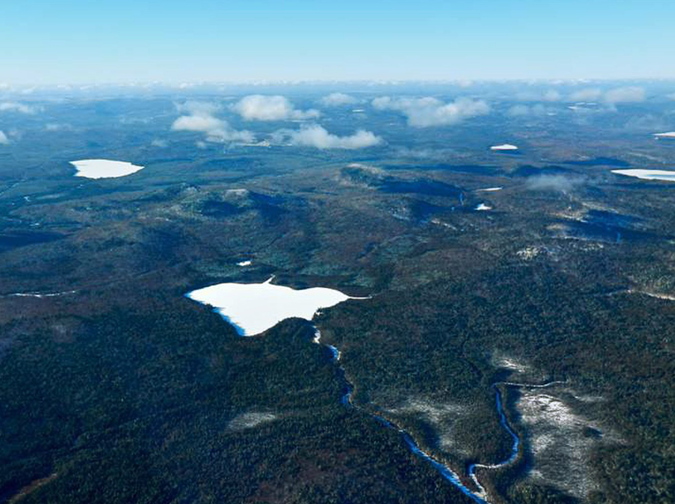AUGUSTA — Democrats on the Legislature’s Natural Resources and Environmental Committee on Thursday voted to recommend rejecting rules designed to revive metal and mineral mining in Maine.
The panel voted 7-5 against the proposed rules, which were given preliminary approval by the Maine Board of Environmental Protection in January but were fiercely opposed by environmental groups. The committee also recommended having the Department of Environmental Protection redraft the rules and present them on Feb. 1, 2016.
The recommendation moves to the House and Senate, where it could be changed before being sent to Gov. Paul LePage. The party line committee vote – and the recommended two-year delay – increases the odds of a veto by LePage, who in 2012 signed a bill that ordered the DEP to draft new mining rules. That bill was designed to bring back an industry that has been dormant since 1991, but it was primarily driven by New Brunswick-based J.D. Irving Ltd.’s interest in mining at Bald Mountain in Aroostook County.
The Bald Mountain proposal, and the accompanying rule-making process, have been controversial from the beginning. Opponents have suspected that J.D. Irving Ltd., an influential lobbying force and the state’s largest landowner, was heavily involved in drafting the proposed regulations.
Democrats on the Natural Resources panel said the two-year delay would allow the Department of Environmental Protection time to adopt better rules. Depending on who is elected governor in November, that process could be overseen by a new administration.
Nick Bennett, a staff scientist for the Natural Resources Council of Maine, said Thursday that the election wasn’t a consideration. “We thought the rules were very bad and that this is an appropriate move,” he said.
Environmental groups have urged lawmakers to kill the new regulations and start over. The opposition has focused on several provisions, including one requiring mine operators to ensure that discharges from closed mining sites meet water quality standards “as soon as practicable,” but in most cases, no longer than 30 years.
Critics say that operators could allow certain types of contaminants to persist longer than 30 years, as long as the time period is defined and the DEP approves. Environmental groups also took issue with changes that would allow open pit mines next to, or on, some lands owned by the state Bureau of Parks and Lands, or adjacent to conservation lands.
Republicans on the committee said they were perplexed by the committee vote, which followed multiple work sessions designed to break an impasse.
“I’m disappointed that we don’t just vote these rules up or down,” said Rep. Richard Campbell, R-Orrington.
Sen. Thomas Saviello, R-Wilton, said he understood Democrats’ concerns, but questioned their opposition to creating a DEP-appointed stakeholder group to help draft the new rules.
“My mistake in helping pass the (rule-making bill in 2012) was not including that stakeholder group,” he said. “I was hoping to fix that here as a way to try and bring the two sides closer together.”
Business groups such as the Maine State Chamber of Commerce backed the new rules, arguing that mining could be a boon for the state and Aroostook County.
The battle over revitalizing metal and mineral mining has pitted some of the state’s major business interests against environmental groups.
Bennett told lawmakers in February that metal mining can release sulfuric acid that can pollute nearby rivers and streams, killing fish and marine life. He said the long-term effects of mining could outlast a company’s interest in a site, so Maine taxpayers could eventually be on the hook for a cleanup.
Bennett said the J.D. Irving Ltd.’s interest in Bald Mountain is the reason the Legislature and the LePage administration had moved so quickly to change the mining regulations.
The 2112 bill directing DEP to rewrite the mining rules was one of the most intensely lobbied measures of the session, drawing over $85,000 in lobbying activity in a single month, according to reports filed with the state ethics commission. Aroostook Timberlands, a subsidiary of J.D. Irving Ltd., was the biggest spender, paying lobbyists $73,348 over one month.
Decades have passed since mining last occurred in Maine. Ben Gilman, speaking for the Maine State Chamber of Commerce, told lawmakers in February that the lack of mining could be attributed to redundant and overly prohibitive rules.
The metals beneath Bald Mountain could be worth as much as $7 billion, according to John S. Cummings, a geologist from Texas who discovered deposits there in the 1970s.
Steve Mistler can be contacted at 791-6345 or at:
smistler@pressherald.com
Twitter: @stevemistler
Send questions/comments to the editors.


